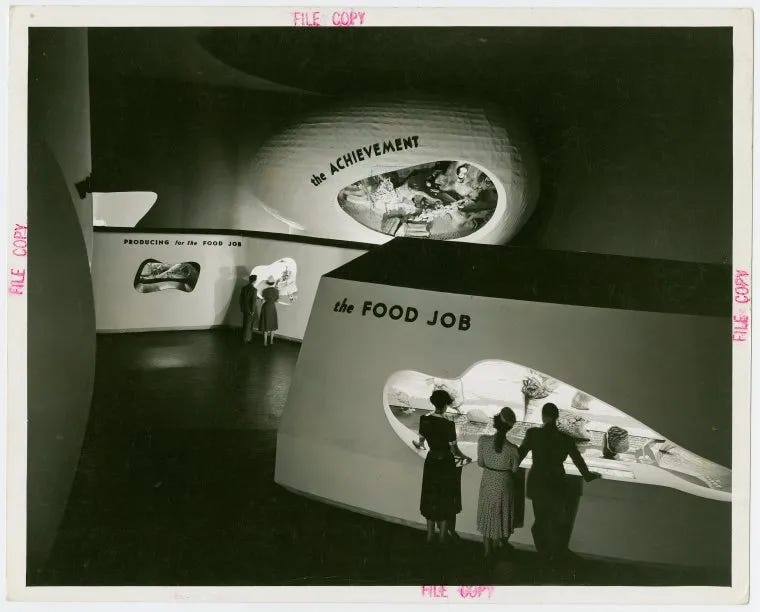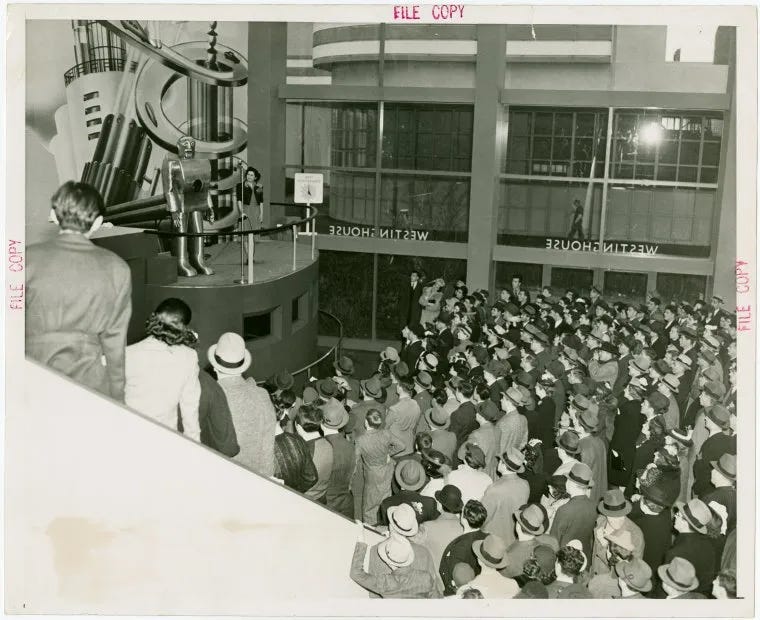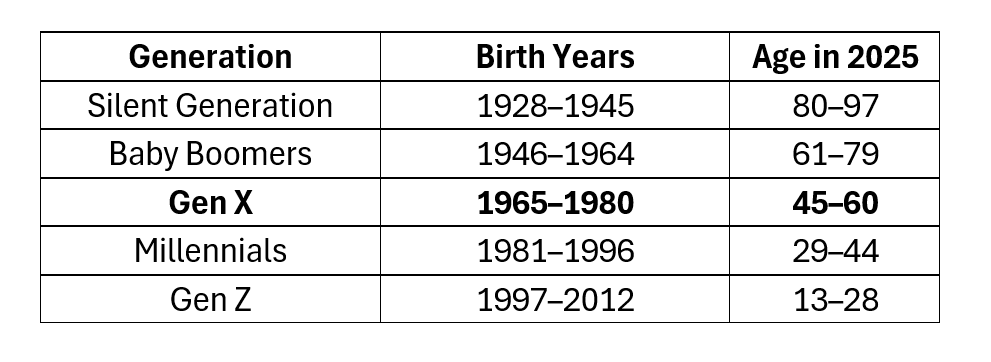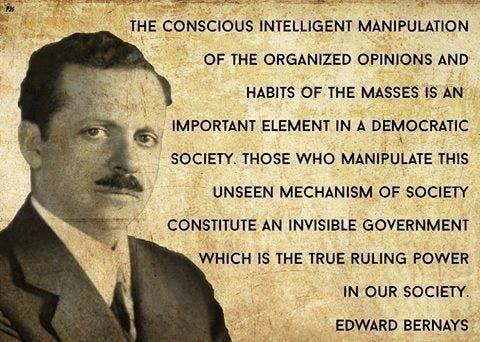Generation X: The Last Analog Humans Explained
How the generation born analog and raised digital became the first casualties of the corporate revolution

In the documentary The Century of the Self, we learn how psychology and propaganda infiltrated American culture.
We see how Edward Bernays and corporations launched an assault on government — and to their credit, the American government did try to warn the people about the propaganda corporations were about to unleash on the population.
Unfortunately, this was a war between government — true government at the time — and corporations. And the corporations, led by Edward Bernays, won. They won with their propagandized vision, their predictive programming of what the future would look like if corporations ran the country.


PS: Thanks to
for their article and a deep dive into what was promised to America.Bernays’ era spanned the 1920s through the 1940s — a time when the first generation went off to war, their children were being born, and then the Baby Boomers arrived, roughly from 1946 to 1955.
Since Bernays won, what emerged was the corporate dream repackaged as the American Dream: get a car, get a house, do what you’re supposed to do. America was coming out of a war, and this vision seemed to work perfectly.
As these Boomers watched the results play out for their parents, they too were drawn into the system: go to school, get a good-paying job, love the American Dream. You’ve got a pension. As we saw in the recent article on retirement, many of you benefited from that dream. Even though some Boomers — particularly the later ones — aren’t experiencing it, most early and some middle Boomers are living the good retirement.
What we’re seeing here is that the very first generation after the war believed in the American Dream — and it worked. Corporate influence wasn’t yet overwhelming. The early Boomers and were preaching the gospel: go to school, get a job, rinse and repeat.
But then these early Boomers started having children as they got settled in. And those children are what we call Generation X.
Gen X: Born Into the American Dream
Generation X are the children of Baby Boomers and late Silent Generation parents. And as they grew up, they were — for the most part — seeing the American Dream work for their parents. Not only did it work for their parents, but it may have worked for their grandparents and the generation before that.
So what you have is this idea: America is right. The American Dream is something that should be cherished, protected, and pursued.
This idea — America, the Dream, the whole mythology — was pushed hard on Generation X, and they grew up on it.
And unfortunately, this was the beginning of corporate programming being pushed to a whole new extreme.
Having won the initial battle, corporations realized they could reach further — and win the war. What we have here is the birth of consumerism, and consumerism began to spread into every industry.
The first generation under full assault from this programming was Generation X — the very first generation to grow up in front of a TV.
And so here we have Generation X: the very first generation to see the cracks in the system and be impacted by those cracks from childhood to the current day.
Generation X: the very first generation to see the cracks in the system and be impacted by those cracks from childhood to the current day.
In this series, we’ll be diving deep into Generation X.
Part One (this article): High-level overview to set the stage.
Part Two: The societal impact of the last few decades on this generation — the unique burden of caring for aging Boomer parents and Millennial children.
Part Three: What the future holds for this generation, and how they can be the most pivotal generation to change course.
So without further ado, let’s dive into the forgotten, yet powerful, yet mighty Generation X.
Gen X: A Generational Snapshot
To level set, here’s a quick table showing the different generations we’re talking about:
For our Gen Xers, we’re talking about 45 to 60-year-olds who were born from around 1965 — the middle of the hippie revolution — through the 1980s, when technology started entering the mainstream.
Based on this timeline alone, you can begin to see within Gen X a shift in how society was changing. From the revolutionary culture of the ’60s — becoming more liberal, more “free,” more everything — to the rise of technology in the ’80s.
It’s an Ahrimanic shift, which we’ll discuss at a later time.
The Last Analog Humans
One of the most critical research points I came across about Generation X is this: they are the last analog human beings.
The term analog not only referred to the media of the times, but it also described the world before the digital one. Analog meant:
Stability, institutions, physical community
A physical world: paper money, in-person work, analog media, face-to-face socializing
Phones, radios, black-and-white TV — real analog
Baby Boomers matured, worked, and often retired before the digital transformation took over society. By the time the digital age arrived, Boomers were already adults. It didn’t rewire them at a neurological level.
They were born into an analog world and stayed there.

Gen X, on the other hand, was born into the old analog world — but they grew up in the digital world.
What’s fascinating is that many of the values from the old world — the American Dream, the family foundation — were carried into the new.
They played outside. Rode bikes until the streetlights came on. They’re the generation that memes describe as “the uncle who gives bad advice.”
But as teenagers and young adults, the digital world exploded around them: personal computers, cable TV, the internet, cell phones, video games, and social media.
They had to translate analog values into digital realities. That’s why we call them the bridge generation. This transformation is a critical piece to understand when we talk about this generation.
This generation was the last humans of the old world, and Gen X were the first humans to enter the digital world.
The American Dream Turns Nightmare
But other factors also define Gen X.
Gen X is the first generation without the security net of pensions that their parents had. They were handed self-funded retirement instead — 401(k)s, market risk, and volatility.
They entered the workforce in the ’80s and ’90s, right as corporations had a couple of wins under their belts and started changing the rules. Examples include the 1978 Revenue Act, which created Section 401(k).
Initially intended as a supplement to pensions, not a replacement, but by 1983, nearly half of all large firms had adopted or were considering 401(k) plans because they were cheaper and shifted investment risk to employees.
Gen X has also been hit by multiple crashes: the dot-com bust in 2000 and the devastating 2008 financial crisis.
They’re known as the sandwich generation — caring for aging Boomer parents while also supporting Millennial and Gen Z children who can’t afford independence.
As I’ve discussed before, Gen X carries the highest average debt per capita of any generation: mortgages, credit cards, student loans, and children’s tuition. Many refinanced during low-interest years and are now being crushed by rising rates. The debt burden is staggering.
Social and Psychological Breakdown
Gen X are the latchkey kids — the very first generation to grow up as divorce became the norm. They had divorced parents, early independence, and unsupervised afternoons. They learned self-sufficiency early, but it came with a cost: emotional detachment.
They watched institutions like church, marriage, and education collapse in real time.
This generation became deeply skeptical. They trust no one. The world their parents promised them began to crack.
Marriage broke down. Families broke down. And we’re seeing the fallout now. Many Gen Xers are navigating midlife divorces, dealing with estranged adult children, or restarting their lives later in life — reflected in shows like The Golden Bachelor and The Later Daters.
The First Victims of the Digital Beast
What we’re seeing here are the first remnants of the digital age — and Gen X was the very first generation to go through this digital transformation.
This is very important, and I’ll write another article just on the digital transformation itself. But here’s the key:
The Greatest Generation (also known as the G.I. Generation), born roughly 1901–1927, came of age during the Great Depression and World War II, with defining events, such as:
The Roaring Twenties (their youth)
The Great Depression (their early adulthood)
World War II (their defining crisis)
The postwar economic boom (their reward)
This generation was the last fully analog humans — the men and women psychologically primed by Bernays and propaganda (WWI–WWII).
The Silent Generation, born 1928–1945, came next. They were too young for WWII and too old for Vietnam. They grew up during the rise of corporate conformity in the 1950s — the era when Bernays’ vision truly took root. They didn’t rebel. They stayed silent. And they passed that conformity forward.
Together, the Greatest Generation and the Silent Generation gave birth to the Baby Boomers.
When this Century of the Self, this corporate world, was handed to their children — the Baby Boomers — it was sold as the American Dream. The Boomers grew up with that postwar faith in systems. And it worked for the Boomers, at least early on.
But it started to break, and Gen X grew up watching those same systems crumble.
Gen X — children primarily of the Boomers and some late Silent Generation parents — is the first generation to be fully impacted by the disease known as consumerism in its full force. This beast that Bernays and the corporations created gave rise to the digital world they now find themselves in.
Consumerism fuels these industries —as I’ve talked about in 1) the modern slave plantation and 2) the neural network technology that’s the perfect tool to control you while extracting your time and attention.
The propaganda machine found a way to make money and control a generation.
And Gen X was the target generation.
What’s Next
In Part Two, we’re going to talk about the real effects of this digital age and how the institutions — the ways of the old — began to break: marriage, religion, health, and more. What does that look like in real life?
In Part Three, we’ll discuss the problems Gen X is facing now and those they’ll encounter in the next 20 to 30 years, based on the data. And I’ll offer some unorthodox, real-world solutions that we’ve shown can work.
Looking forward to diving into that.
As always, thank you for your time and attention. Have a great and wonderful day.
— Ashe,
Franklin O’Kanu
If you enjoyed this work and gained value from it, support more work like this by becoming a paid subscriber for $5/month
FURTHER READING
If you want to dive deeper into the themes explored in this series, here are essential readings that provide critical context:
How Corporations Influence You and Control Your Actions —Understanding Edward Bernays and the propaganda machine that shaped modern society. This piece explores how Bernays weaponized psychology to bypass logic and target emotion — the foundation of the corporate dream sold to Boomers and weaponized against Gen X. If you want to understand how the American Dream became a tool of control, start here.
Past as Prologue: When America Received a Message from the Future — Anton Cebalo (Novum Newsletter). A sharp dive into the 1939 NY World’s Fair, Bernays’ role, and how consumer desire got welded to American democracy (Futurama, “Democracity,” and the salesmen’s dream of the future).
“The Perfect Tool to Control You and Make Them Money” — How neural network technology depletes our cognitive essence while maximizing corporate profit.
This article breaks down why Apple, Microsoft, and Google aren’t just “tech companies” — they’re neural network technology companies designed to extract attention, diminish focus, and turn humans into “doers, not thinkers.” Essential reading for understanding why Gen X, as the first generation raised by screens, became the testing ground for digital control.
The Century of the Self (Adam Curtis, BBC, 2002)
A four-part documentary tracing how Freud’s theories were used to engineer mass behavior through marketing, politics, and public relations across the 20th century.
Support Unorthodoxy!
If this article opened your eyes, there’s more behind the paywall. Exclusive, in-depth pieces that go deeper, challenge more, and reveal the truths they don’t want us to see.
🔑 Become a paid member and gain access to premium and archived articles, exclusive podcasts, and thought-provoking chats you won’t find anywhere else.
📖 Prefer a comprehensive take? My book, An Unorthodox Truth, is a fact-based journey through 200 years of deception—a must-read for those seeking clarity in a manipulated world.
☕ Feeling generous? Leave a simple tip to support this work—every bit helps me continue creating meaningful content.







I was born in 1980 so I'm the last of the GenX generation and you nailed this post brother. I didn't go on the internet until I was at least 19 years old; I was so computer stupid that in my first college class the teacher told us to get an email address and I thought I had to go to the post office to do so. It really wasn't until cell phones become prevalent that I really noticed a change in society and once Iphones came out everything just went to shit even quicker. I've become a luddite over the years, the advent of technology has made the world much worse and whatever advantages we receive from said tech pales in comparison to the harms it causes. I weep for all generations after mine as they have no idea what has been lost due to their beloved technology.
My husband was a director on Wall Street and was present for top level meetings. He said that in a meeting with government representatives the firm told the US government representatives how much money they would get that year and what their tax rate would be. It should be the other way around! The government should decide the tax rate, not a corporation. We moved to South America not long after. I had seen plenty of concerning things with the pharmaceutical companies myself. If we had seen Trump on the horizon we would have stayed, but 20 years ago it looked hopeless.